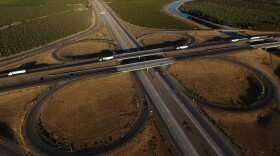Vietnamese automaker Vinfast plunged right into the crowded and hypercompetitive U.S. auto market, gambling that if it can sell its electric vehicles to finicky Americans, it can succeed anywhere.
So far, that gamble has yet to pay off. Its CEO Le Thi Thu Thuy said in a recent interview with The Associated Press that the U.S. market is “difficult.” It has sold just 2,009 electric vehicles in the U.S., less than 1% of total of total U.S. EV sales, according to Motorintelligence.com.
Worldwide, Vinfast sold just 19,562 EVs from April-September, well below its 2023 target of 50,000.
But Vinfast is committed to riding the wave of countries trying to switch to EVs to cut emissions, Thuy said while speaking with The Associated Press at Vinfast's sleek headquarters in Hanoi.
Prioritizing the U.S. market, despite its stringent regulations, tough scrutiny by the media, and opposition from Vinfast's advisers was a deliberate decision, she said.
“We wanted to go make our name in a very difficult market. Our rationale was very simple. If we can make it there, I mean, people will believe in us,” Thuy said. “So it's an approval stamp to some extent. But it is very difficult.”
Vinfast is a part of Vingroup, a sprawling conglomerate that began as an instant noodle company in Ukraine in the 1990s. The company built its first car in 2019 in a seaside factory close to Haiphong, where engineers monitor screens as gleaming metal sheets are expertly snatched by robotic arms and pressed to make frames, doors and other parts that are welded, assembled and painted before the vehicles are tested.
In mid-August, Vinfast listed its shares on the Nasdaq, seeing them more than double in value to a peak of $82.35 that briefly put its market value above those of General Motors Corp. and Ford Motor Co. in late August. They are now trading at about $5.70.
But while investor enthusiasm cooled after an initial buying frenzy, the company is committed to the U.S. market: it is building a $4 billion EV factory southwest of Raleigh, North Carolina, where production is planned to begin next year.
Later this year, Vinfast plans to begin delivering EVs in Europe, Thuy said. It also is targeting markets in Southeast Asia, India and the Middle East, investing $400 million in electric vehicle factories in India and Indonesia. It aims to have a presence in 50 markets worldwide by 2024.
Vinfast is part of Vingroup, whose founder Pham Nhat Vuong became Vietnam's richest man as the group's revenue ballooned more than 50-fold in 2011-2022 to over $5.5 billion.
The automaker's ambitions dovetail with communist-ruled Vietnam's plan to make the auto industry a backbone of the economy: its tree-lined EV factory was built in less than two years by reclaiming 335 hectares of land from the sea. For now, it's using only a fraction of its capacity to roll out 250,000 EVs a year.
Vingroup's backing “helps immensely,” said Matthew Degen, a senior editor at Kelley Blue Book, an American car research company. The question is whether Vuong has the “stomach to go possibly years and years” losing money before Vinfast eventually becomes profitable.
Vinfast quickly abandoned a plan to sell EVs directly to customers like Tesla does and now is focused on working with dealers in the U.S. and Canada to capitalize on their local knowledge, Thuy said.
“We realized that this movement towards EVs is a lot faster than anticipated – and we need to join forces,” she said.
The few automakers that have managed to break into the U.S. have done so by either selling cheaper cars initially, like Hyundai or Kia, or by building a reputation based on performance or design, said Sam Abuelsamid, a mobility analyst for Guidehouse Insights.
“You’ve got to have something that distinguishes you from everyone ... Why are you different?” he said.
So far, it's unclear what might attract buyers.
Not price. Vinfast’s VF8 crossover or medium-sized SUV starts at $46,000 in California, compared to the $43,990 for a Tesla Model Y. Tesla also qualifies for an additional $7,500 federal tax credit, which Vinfast won't be eligible for until it begins making cars in their U.S. factory.
The VF8 sedan is around the same size as models made by EV rivals, like Nissan’s Ariya but has a range of 264 miles (424 kilometers) on a single charge. The Ariya can go up to 304 miles on a charge.
The company could potentially reduce its manufacturing costs to make its cars more affordable, Abuelsamid said. But that would eat into any profit.
“It just costs so much money to start a car company from scratch,” he said.
Vinfast is expecting fresh investments of $1.2 billion from its founder and others in the next six months, as the company, said in a securities filing this month.
EV makers without that kind of backing, like the Ohio-based Lordstown Motors in the U.S., which declared bankruptcy in June, are struggling to attain the scale they need to attain profitability. This month, Chinese EV maker WM Motor filed for bankruptcy.
Thuy said Vinfast hopes to attain the scale it needs to make it with sales in Asia. Its two plants in Indonesia and one in India are expected to turn out a total of 50,000 EVs annually, with production slated to begin in 2026, according to a securities filing.
Vinfast's detractors say its sales of more than 7,000 of its EVs to Vingroup’s Green Smart Mobility taxi company reflects weak private demand for the vehicles. Thuy said the deployment of hundreds of its bright blue VF 8s and Feliz S electric scooters is a strategy to familiarize people with EVs, which are quieter and come with connectivity and other options lacking in gas or diesel-powered cars.
“It’s like switching from analog phones to smart phones, basically,” she said.
Private car ownership is relatively new for Vietnam's 97 million people, who mostly rely on the 65 million Honda and Yamaha motorcycles and scooters that dominate the roads.
But with growing affluence, car sales are steadily rising: more than 500,000 cars were sold in 2022, according to the Vietnam Automobile Manufacturers’ Association. That makes Vietnam 24th in terms of vehicles sold. Toyota Motor Corp., Mitsubishi Motor Corp. and Kia dominate the market, and Chinese rivals like BYD are gaining ground.
Vinfast introduced its VF5 Plus SUV for the local market in April. It sells for $22,000. Next year, it plans to launch sales of a “mini” electric vehicle, only 3.1 meters (10.1 feet) long compared with the average 4 meter (13.1 feet) length of most compact cars.
Vinfast announced on Oct 11 that it was acquiring VinEF, a Vingroup battery company, in a move that it said would cut costs for batteries by 5%-7%. That would help, Degen of Kelley Blue Book said, but only if it brings prices down significantly.
Ultimately, he said, Vinfast needs a car that can compete with those of its rivals.
“What will they bring to the table that is better than their rivals and that will make consumers want to take a chance on them and give them business instead of the many other terrific offerings from established players?”
AP Auto Writer Tom Krisher in Detroit contributed.
Associated Press climate and environmental coverage receives support from several private foundations. See more about AP’s climate initiative here. The AP is solely responsible for all content.






